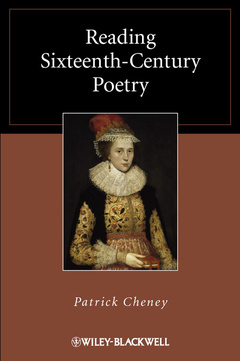Description
Reading Sixteenth-Century Poetry
Wiley Blackwell Reading Poetry Series
Author: Cheney Patrick
Language: English
Keywords
poetry; context; close; critical; sixteenthcentury; readings; individual; historical; combines; consideration; poems; reading; critic; accessibility; cheney; patrick; dynamic; modern; century; sixteenth; emphasises; illuminating; broad; genres
352 p. · 16x23.9 cm · Hardback
Description
/li>Contents
/li>Readership
/li>Biography
/li>
- Close reading of a wide variety of sixteenth-century poems, canonical and non-canonical, by men and by women, from print and manuscript culture, across the major literary modes and genres
- Poems read within their historical context, with reference to five major cultural revolutions: Renaissance humanism, the Reformation, the modern nation-state, companionate marriage, and the scientific revolution
- Offers in-depth discussion of Skelton, Wyatt, Surrey, Isabella Whitney, Gascoigne, Philip Sidney, Spenser, Marlowe, Mary Sidney Herbert, Donne, and Shakespeare
- Presents a separate study of all five of Shakespeare?s major poems - Venus and Adonis, The Rape of Lucrece, 'The Phoenix and Turtle,' the Sonnets, and A Lover's Complaint- in the context of his dramatic career
- Discusses major works of literary criticism by Plato, Aristotle, Horace, Longinus, Philip Sidney, George Puttenham, Percy Bysshe Shelley, Seamus Heaney, Adrienne Rich, and Helen Vendler
Introduction 1
The Pleasures and Uses of Sixteenth-Century Poetry
Part I 1500–1558. Reading Early Tudor Poetry: Henrician, Edwardian, Marian 19
1 Voice 21
The Poetic Style of Character: Plain and Eloquent Speaking
2 Perception 43
The Crisis of the Reformation, or, What the Poet Sees: Self, Beloved, God
3 World 66
The Poet’s Ecology of Place: Sky, Sea, Soil
4 Form 90
The Idea of a Poem: Elegy, Pastoral, Sonnet, Satire, Epic
5 Career 115
The Role of the Poet in Society: Skelton, Wyatt, and Surrey
Part II 1558–1600. Reading Elizabethan Poetry 139
6 Voice 141
The Poetic Style of Character: From Plain Eloquence to the Metaphysical Sublime
7 Perception 163
What the Poet Sees, and the Advent of Modern Personage: Desire, Idolatry, Transport, Partnership
8 World 185
The Poet’s Ecology of Place: Cosmos, Colony, Country
9 Form 208
Fictions of Poetic Kind: Pastoral, Sonnet, Epic, Minor Epic, Hymn
10 Career 231
The Role of the Poet in Society: Whitney, Spenser, and Marlowe
Part III A Special Case 255
11 Shakespeare: Voice, Perception, World, Form, Career 257
Conclusion 280
Retrospective Poetry: Donne and the End of Sixteenth-Century Poetry
Bibliography 288
Index 323
These books may interest you

The Complete Poems of Shakespeare 184.47 €



